Squarespace vs Elementor: Final verdict
Squarespace and Elementor both offer powerful website building solutions, but they cater to different user needs and preferences.
Squarespace (Overall Grade: 7.9/10)
is a user-friendly website builder and hosting platform that simplifies the process of creating professional websites. It offers a range of visually appealing templates, built-in marketing tools, and robust ecommerce features. Squarespace is ideal for users seeking an all-in-one solution with a hassle-free setup and strong customer support. However, it has some limitations in customization and advanced features compared to Elementor.
Elementor (Overall Grade: 7.4/10)
is a flexible website builder plugin for WordPress, known for its drag-and-drop interface and extensive customization options. It provides a wide range of widgets and templates, making it suitable for both beginners and professional web designers. Elementor excels in design functionalities and templates, offering more creative control and advanced features. However, it may require a steeper learning curve and potential performance optimization for extensive widget use.

|

|
|
|---|---|---|
Design functionalities & templates |
8.0 |
9.2 |
Ease of use |
8.3 |
8.8 |
Ecommerce |
8.2 |
7.6 |
Website Editors |
8.3 |
8.5 |
Product testing options |
7.4 |
5.6 |
Price |
8.4 |
8.0 |
Hosting quality |
7.6 |
7.8 |
Website speed optimization |
6.7 |
6.7 |
Plugins and integrations |
6.8 |
7.6 |
Marketing features |
8.1 |
7.8 |
Customer support |
7.8 |
7.2 |
Security |
8.8 |
9.1 |
AI capabilities |
7.5 |
7.4 |
User Management |
7.4 |
8.8 |
Which one is the best for ecommerce: Squarespace or Elementor?
 8.2
8.2
 7.6
7.6
Verdict
: Squarespace is ideal for those seeking an all-in-one, user-friendly ecommerce solution, while Elementor offers extensive customization for users familiar with WordPress and WooCommerce.
Squarespace
: Squarespace is a robust platform for ecommerce, offering an intuitive interface and essential built-in tools for secure payment processing, marketing, and SEO. It simplifies the process of setting up an online store, making it a great choice for users who prefer an all-in-one solution. However, when comparing Squarespace vs Elementor, Squarespace may lack the deep customization options that advanced users might seek.
Elementor
: Elementor, integrated with WooCommerce, provides powerful ecommerce capabilities with extensive customization options. It is suitable for users who are comfortable with WordPress and want to leverage a wide range of widgets and templates. However, it may present a steeper learning curve and potential performance issues with extensive widget use.
Which one is the best for informational and business websites?
 8.4
8.4
 8.9
8.9
Verdict
: When it comes to creating informational and business websites, Elementor slightly edges out Squarespace due to its higher flexibility and customization options. However, both platforms are strong contenders, each with its unique strengths.
Squarespace
: Squarespace is a robust website builder that excels in providing a user-friendly experience with a variety of professional templates. It is particularly well-suited for users who want a hassle-free website creation process without delving into coding. Squarespace’s templates are visually appealing and cater to a wide range of industries, making it a solid choice for business websites. With a score of 8.4, Squarespace offers a comprehensive set of features that are ideal for creating polished and professional informational sites.
Elementor
: Elementor, a popular WordPress plugin, offers unparalleled flexibility and customization through its visual drag-and-drop interface. It allows users to design every detail of their website, making it suitable for both beginners and professional web designers. Elementor’s extensive range of widgets and templates, along with its support for responsive design, ensures that websites look great on all devices. Scoring 8.9, Elementor stands out for its ability to integrate with various WordPress themes and plugins, providing a versatile and powerful platform for creating highly customized informational and business websites.
Squarespace vs Elementor: Detailed comparison
Design functionalities & templates
Design FunctionalitiesRepresents how well each platform allows for creative design and customization of websites.Score Components:
- Template Variety (30%): Range and quality of design templates.
- Customization (30%): Flexibility and options for design alterations.
- User Interface (20%): Ease and intuitiveness of the design process.
- Responsiveness (10%): Adaptability to different devices and screen sizes.
- Innovation (10%): Unique design features and tools.
 8.0
8.0
 9.2
9.2
🏆
Winner: Elementor.
If you’re looking for a platform that offers more creative control, a wide array of design features, and a higher score in design functionalities and templates, Elementor is the preferred choice.
Squarespace boasts an impressive variety of website templates, offering over 120 pre-designed options to choose from. These templates cater to a wide range of needs and industries, from creative portfolios and sleek online stores to professional business websites and personal blogs.


Compared to Squarespace, Elementor offers an extensive range of templates and designs, with over 100 responsive website kits covering various categories like business, creative, education, and more, directly available through Elementor’s platform. Additional sources like Envato Elements, Template Monster, and others provide a wider selection, including free and premium options, catering to diverse web design needs.


Get a head start on website creation with AI
Create a custom website tailored to your business needs 10X faster with 10Web AI Website Builder!
Ease of use
Ease of useReflects the platform’s overall user-friendliness.Score
Components:
- Learning curve (40%): Quickness and ease of getting started.
- Interface design (30%): Simplicity and intuitiveness of layout.
- User guidance (20%): Quality of tutorials and support.
- Flexibility (10%): Adaptability to various user skills.
 8.3
8.3
 8.8
8.8
🏆 Winner: Elementor
. With a score of 8.8, Elementor edges out Squarespace (8.3) in terms of ease of use. Elementor’s user-friendly interface, drag-and-drop functionality, and wide range of pre-designed templates and widgets make it a flexible and intuitive platform for building websites. Squarespace, while also user-friendly and straightforward, has some limitations in customization and advanced features.
Learning Resources
🏆 Winner: Tie
. Both Squarespace and Elementor provide extensive learning resources for their users. Squarespace offers a comprehensive Help Center, video tutorials, live webinars, an informative blog, and an active community forum. Elementor, on the other hand, provides a wide array of learning resources through its Elementor Academy, covering topics from basic usage to advanced design and business growth strategies.
For ecommerce
EcommerceMeasures the platform’s effectiveness in supporting online business activities.Score Components:
- Ecommerce themes and templates (20%): Variety and design of templates.
- Product management (25%): Ease of managing and organizing products.
- Payment options (25%): Variety and convenience of payment methods.
- Ecommerce features (20%): Features for managing an ecommerce store.
- Integration (10%): Compatibility with external e-commerce tools and services.
 8.2
8.2
 7.6
7.6
Squarespace and Elementor both offer robust ecommerce capabilities, but they cater to different needs and preferences. Squarespace is a user-friendly solution that simplifies online store setup with an intuitive interface and customizable templates. It handles secure payment processing, flexible shipping options, and automated tax calculations, while also providing built-in marketing tools, SEO optimization, and detailed analytics.
On the other hand, Elementor offers robust ecommerce capabilities through its seamless integration with WooCommerce, providing customizable product pages, a variety of ecommerce-specific widgets, and responsive design templates. However, users may face a learning curve and potential performance issues with extensive widget use.
 |
 |
|
|---|---|---|
Ecommerce themes and templates |
7.5 |
7.8 |
Product page customization |
7.0 |
8.4 |
Payment processing and commissions |
7.8 |
7.5 |
POS capabilities |
6.5 |
5.5 |
Payment gateways |
7.5 |
7.0 |
Product numbers |
6.8 |
7.0 |
Additional ecommerce features |
7.2 |
8.0 |
Squarespace ecommerce features:
- Intuitive interface
- Secure payment processing
- Built-in marketing tools
- SEO optimization
- Website analytics
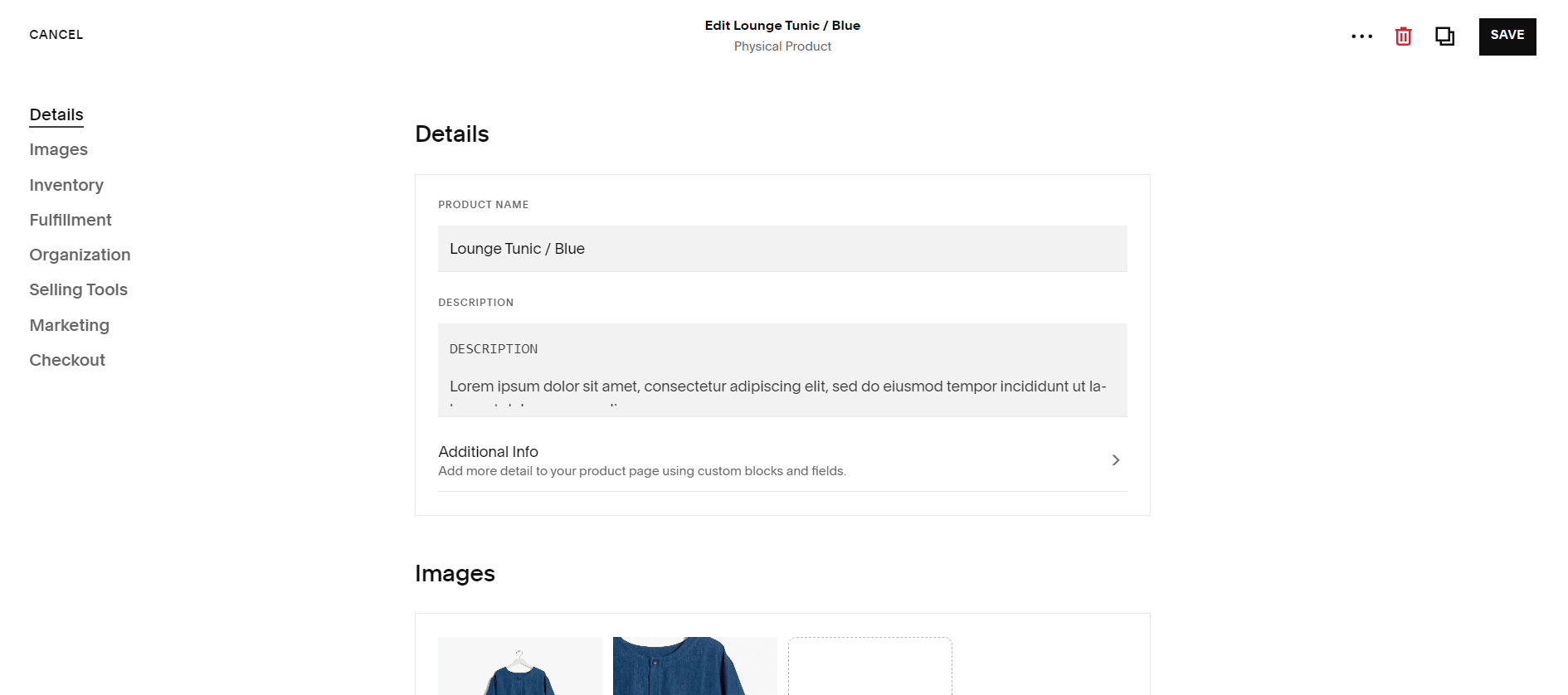
Elementor ecommerce features:
- WooCommerce Integration
- Customizable Product Pages
- Ecommerce Widgets
- Product Categories and Filters
- Shopping Cart Customization
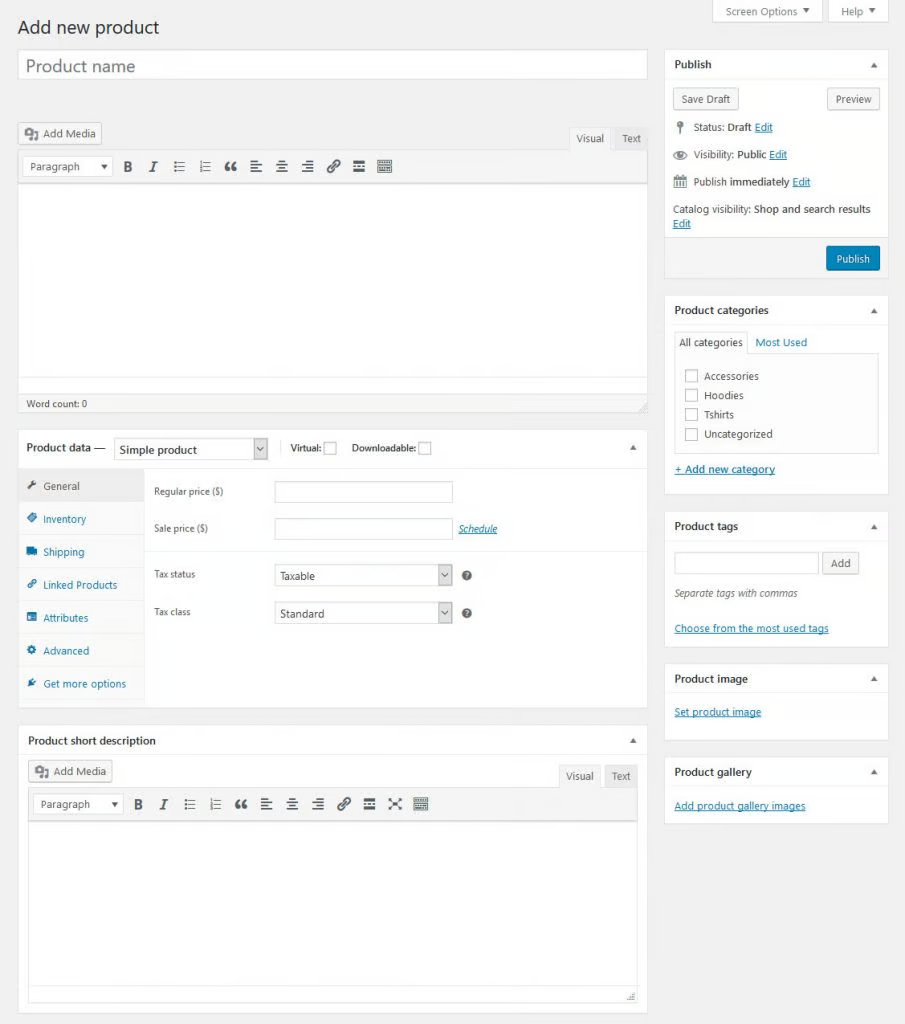
Ecommerce themes & templates
Squarespace provides a diverse selection of around 50 ecommerce templates, catering to various industries like fashion, beauty, home goods, and technology. These templates range from clean and minimalist to bold and colorful, accommodating different brand aesthetics and product types.
Elementor, on the other hand, offers a diverse range of ecommerce-specific templates suitable for various online stores, from free options for budget-conscious users to premium templates with advanced customization features. These templates are designed to be mobile-responsive and SEO-friendly, ensuring optimal performance across devices and search engines.
Product page customization
Squarespace offers options for layout, design, and interactive elements on product pages. Choose templates, customize colors, fonts, and content. Enhance engagement with features like customizable buttons, wishlists, comparisons, reviews, and related products.
Elementor offers extensive customization options for WooCommerce product pages, including custom layouts, WooCommerce widgets for various product elements, and options for styling product galleries and ‘Add to Cart’ buttons. It allows for the display and customization of product variants, although the number of variants is technically limited by WooCommerce, not Elementor.
Payment processing
Squarespace provides flexible payment processing for online stores with integrated gateways like Stripe and PayPal. External gateways can be set up for specific needs. Transaction fees may apply depending on the plan and payment method.
Elementor supports several payment gateways, notably through plugins and integrations, with Stripe and PayPal being prominent options for simple and widespread use. These gateways charge their own transaction fees, typically around 2.9% + $0.30 per transaction, but Elementor itself does not impose additional fees for transactions.
Website Editors
Website EditorsEvaluates the platforms’ website building and editing capabilities.Score Components:
- Customization tools (40%): Range and power of editing features.
- Editor usability (30%): User experience within the editor.
- Design flexibility (20%): Freedom in layout and design changes.
- Update and maintenance ease (10%): Simplicity of updating and maintaining the site.
 8.3
8.3
 8.5
8.5
🏆
Winner: Elementor
. Elementor, with a score of 8.5, offers a drag-and-drop interface that makes it easy to customize layouts, add content, and style websites visually in real-time. It provides a wide array of widgets and templates, allowing users to design complex elements such as sliders, forms, and animated headlines. Additionally, Elementor provides responsive design options, ensuring websites look great on all devices, alongside advanced features like custom CSS, role-based access control, and integration with a variety of marketing tools.
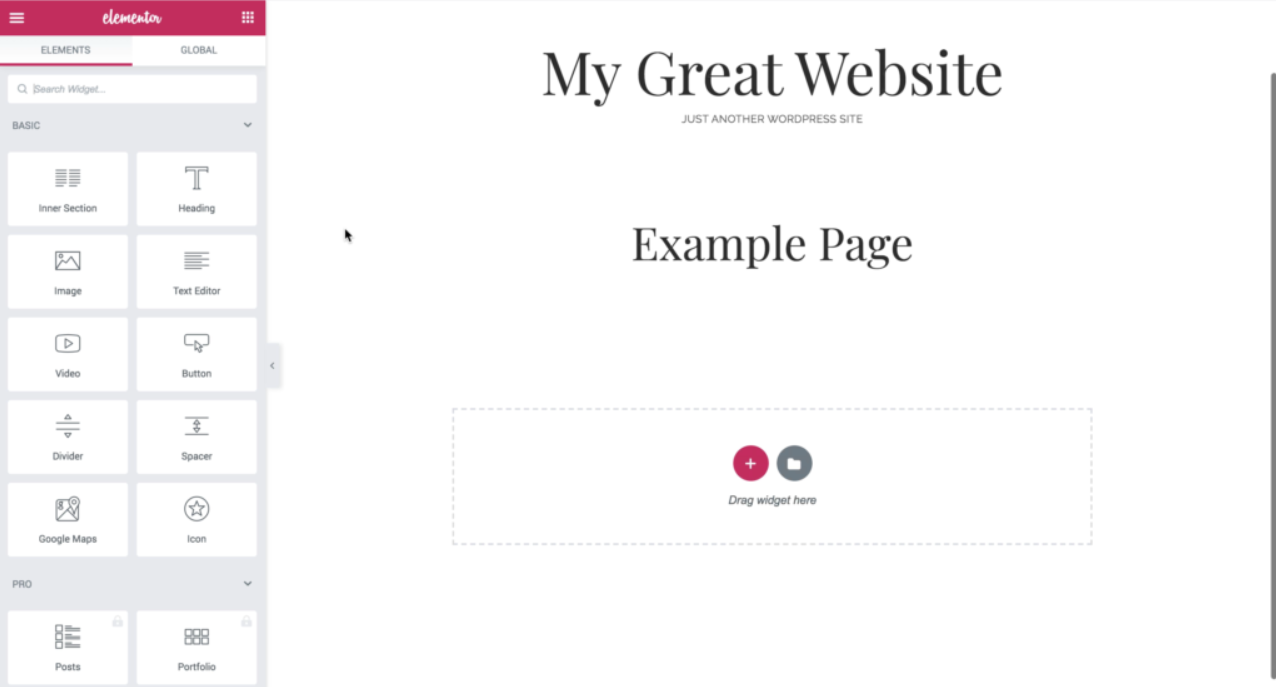
Squarespace’s editor, scoring 8.3, allows easy drag-and-drop website creation without coding. With visually appealing templates and customization options, it caters to beginners and pros alike.
The real-time editing experience ensures instant previews. Prioritizing content, it’s mobile-responsive and offers functional features like forms, social media integration, and online stores. Squarespace seamlessly integrates with tools for extended capabilities.
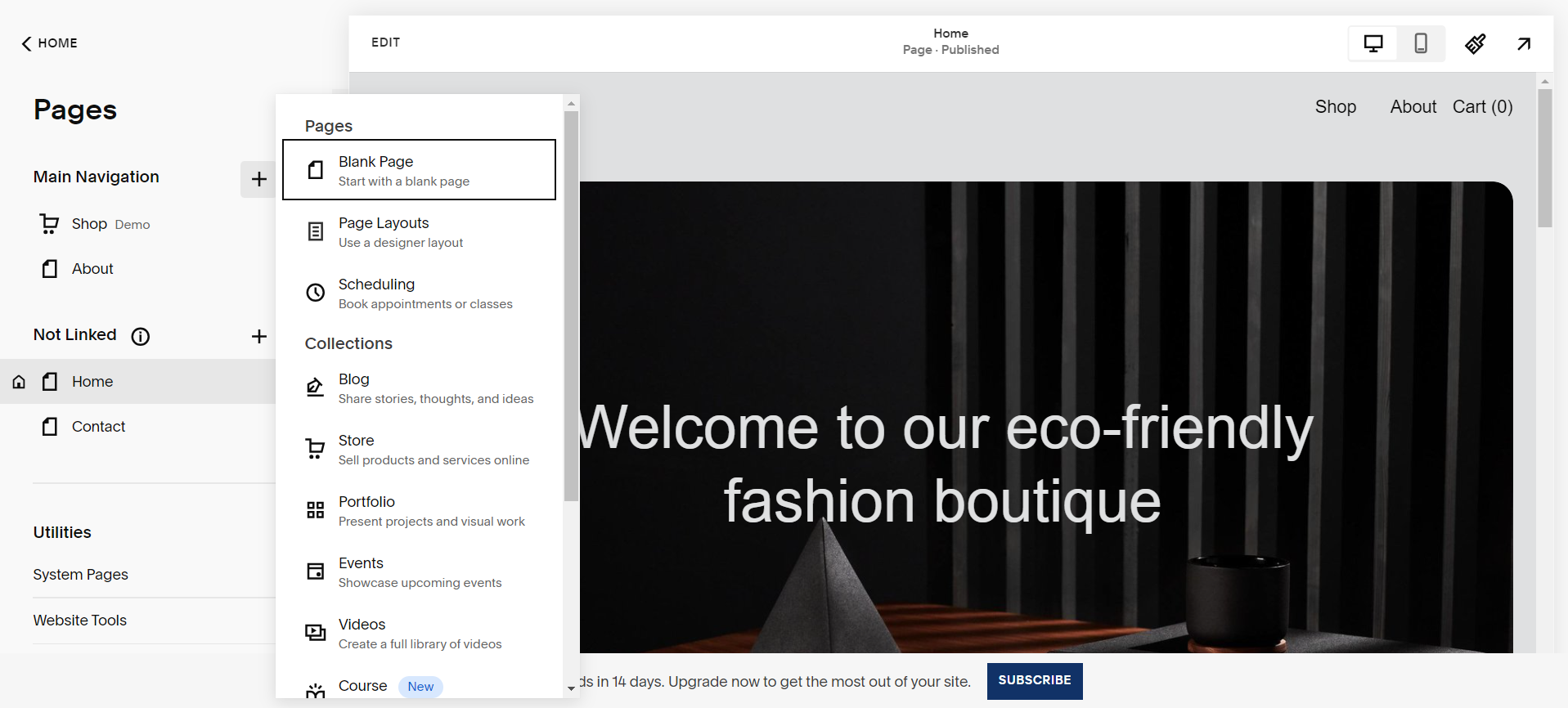
Mobile editor/app
 8.5
8.5
 0
0

🏆
Winner: Squarespace
. Squarespace offers a mobile app that allows users to manage their website on the go. The app includes features for content editing, website analytics, online store management, and social media scheduling. However, it’s worth noting that for complex tasks such as advanced design customization or creating new page layouts, users will need to access the desktop editor, as the app doesn’t offer the full range of functionalities available on desktop.
On the other hand, Elementor does not have a dedicated mobile editor. This means that users cannot manage or edit their websites from a mobile device, which can be a significant disadvantage for those who need to make quick changes or updates on the go. Therefore, Squarespace is the clear winner in this category due to its mobile editing capabilities.
Product testing options
Product Testing OptionsAssesses the options for trying out platform features before commitment.Score Components:
- Trial quality (40%): Extent and usefulness of the trial or free version.
- Feature accessibility (30%): How many features are available to test.
- Trial duration (20%): Length of the trial period.
- Ease of transition (10%): Smoothness of moving from trial to paid plans.
 7.4
7.4
 5.6
5.6
Overall Result
:
Squarespace wins
. Squarespace scores 7.4, offering a 14-day free trial and the possibility to test most of the premium features. Elementor, scoring 5.6, offers a free version for self-hosted WordPress.org but lacks a trial version. However, it does provide a 30-day money-back guarantee and the possibility to test all premium features during the refundable period.
 |
 |
|
|---|---|---|
Free Plan |
No (14-day free trial) | Yes, but only for self-hosted WordPress.org |
Trial Duration |
14 days | No trial version available |
Testing Premium Features |
Most of the premium features, except for custom code, premium integrations and removal of Squarespace branding | All premium features during the refundable period |
Money Back Guarantee |
Full refund within 14 days | 30-day money back guarantee |
Price
PriceLooks at the cost-effectiveness and value for money of each platform.Score Components:
- Plan value (40%): What each pricing tier offers.
- Transparency and clarity (30%): Clearness of pricing structures.
- Flexibility of plans (20%): Range of options to suit different budgets.
- Hidden costs (10%): Additional expenses not included in the plan.
 8.4
8.4
 8.0
8.0
Squarespace and Elementor have similar price scores, but their offerings differ significantly.
Squarespace provides a more comprehensive package, including hosting, and offers discounts for annual subscriptions. Elementor, on the other hand, is a WordPress plugin and its plans are billed annually.

|

|
|
|---|---|---|
$5-$15 |
Personal ($12/month): Build a basic website with limited features for personal use. Access to basic templates, mobile-friendly design, and some social media integrations. Value for price: 6.0 |
Basic ($9.99/month): 1 website, with 10GB SSD storage, 25k monthly visitors, 30GB monthly bandwidth, daily auto backups stored for 14 days, Cloudflare CDN, and integrated caching tool Value for price: 6.5 |
$15-$20 |
Business ($16/month): Upgrade features with custom domain, SEO tools, marketing tools like email campaigns, and analytics. Value for price: 7.5 |
Business ($19.99/month): 1 website, with 20GB SSD storage, 50k monthly visitors, 50GB monthly bandwidth, daily auto backups stored for 30 days, Cloudflare CDN, integrated caching tool and access to staging environment Value for price: 7.5 |
$20-$30 |
Commerce ($26/month): Perfect for online stores with built-in eCommerce functionality (unlimited products), secure checkout, inventory management, and marketing tools. Value for price: 8.5 |
Grow ($22.99/month): 3 websites, with 30GB SSD storage, 75k monthly visitors, 75GB monthly bandwidth, daily auto backups stored for 30 days, Cloudflare CDN, integrated caching tool, access to staging environment and site cloning Value for price: 8.5 |
$40+ |
Advanced Commerce ($40/month): Cater to high-volume stores with advanced eCommerce features like abandoned cart recovery, product subscriptions, gift cards, and real-time shipping quotes. Value for price: 9.0 |
Scale ($49.99/month): 10 websites, with 40GB SSD storage, 100k monthly visitors, 100GB monthly bandwidth, daily auto backups stored for 30 days, Cloudflare CDN, integrated caching tool, access to staging environment and site cloning Value for price: 9.0 |
location. As a result in rare cases the prices displayed here can differ from the ones you see on their
websites.
Hosting quality
Hosting
qualityExamines the reliability and performance of the hosting solutions.Score Components:
- Uptime (40%): Consistency and reliability of website availability.
- Speed (30%): Loading times and performance.
- Bandwidth and storage (20%): Sufficiency of resources provided.
- Data centers (10%): Quality and distribution of hosting infrastructure.
 7.6
7.6
 7.8
7.8
Winner: Elementor
. Elementor edges out Squarespace with its Google Cloud powered hosting, offering daily auto backups and a 99.9% uptime guarantee. Squarespace, while offering a similar uptime guarantee, falls short with less specific information about its data centers and backup services.
 |
 |
|
|---|---|---|
Do they offer hosting? |
Yes, included in all paid plans |
Yes, included in all paid plans, Google Cloud powered hosting, with 10-40GB SSD storage, and daily auto backups stored from 14 to 30 days depending on the plan |
Data Centers: |
Squarespace’s data centers are strategically scattered across North America, Europe, and Asia |
1 data center in Belgium |
Type of hosting: |
Proprietary cloud-based hosting |
Managed WordPress Hosting |
Uptime: |
99.9% |
99.9% |
Uptime Guarantee: |
Yes, 99.9% |
Yes, 99.9% |
Website Speed Optimization
Website Speed OptimizationEvaluates optimization of website loading timesScore Components:
- PageSpeed Score (30%): Google’s score indicating performance optimization.
- Loading Time (30%): The average time until a website is fully interactive.
- Mobile Optimization (15%): Optimization effectiveness for mobile devices.
- Resource Optimization (15%): Optimizing images, scripts, and other heavy resources.
- CDN Usage (10%): Use of CDN to enhance speed across geolocations.
 6.7
6.7
 6.7
6.7
🏆 Winner: Squarespace
Both Squarespace and Elementor have similar website speed optimization scores, but Squarespace edges out Elementor due to its transparency in Core Web Vitals improvements and more specific load times and PageSpeed score ranges.
 |
 |
|
|---|---|---|
Focus |
Responsive design, image optimization |
Lazy Loading, Code Minification |
Performance Tools |
CDN, code minification, lazy loading |
Caching, CDN |
Key Strategies |
Responsive design, image optimization, CDN, code minification, lazy loading |
Lazy Loading, Code Minification, Caching, CDN |
Load Times |
0.7s to 9.1 s (Average: 2.9s) |
Varies depending on optimization and website complexity |
Page Speed Scores Range |
20/100 to 93/100 (Average: 62.7/100) |
Varies depending on optimization and website complexity |
Core Web Vitals Improvement |
Emphasis on LCP, FID, CLS improvements |
No disclosed information |
Squarespace’s approach to website speed optimization includes responsive design, image optimization, use of a content delivery network (CDN), code minification, and lazy loading of images. These strategies help to improve load times and PageSpeed scores, which range from 0.7s to 9.1s (average 2.9s) and 20/100 to 93/100 (average 62.7/100) respectively. Squarespace also places emphasis on improving Core Web Vitals, specifically LCP, FID, and CLS.
On the other hand, Elementor’s strategies for website speed optimization include lazy loading, code minification, caching, and use of a CDN. However, Elementor does not provide specific information on load times, PageSpeed scores, or Core Web Vitals improvements, stating that these vary depending on optimization and website complexity. This lack of transparency makes it difficult to accurately assess Elementor’s performance in terms of website speed optimization.
Get a head start on website creation with AI
Create a custom website tailored to your business needs 10X faster with 10Web AI Website Builder!
Plugins and integrations
Plugins and integrationsMeasures the range and effectiveness of additional plugins and integrations.Score Components:
- Variety of options (40%): Range of available add-ons.
- Integration smoothness (30%): Ease of integrating plugins into the site.
- Quality of plugins (20%): Functionality and reliability of the options.
- Custom integration capabilities (10%): Support for custom or third-party integrations.
 6.8
6.8
 7.6
7.6
🏆 Winner: Elementor.
Elementor, with a score of 7.6, offers a wide range of both free and premium add-ons that extend the functionality of the base version, providing advanced widgets, modules, and complete theme building capabilities for deep customization.
Squarespace, scoring 6.8, lacks an official app store but supports integrations and extensions through custom code injection and third-party tools. While Squarespace offers seamless functionality with over 20 official partner integrations, Elementor’s flexibility and versatility give it the edge in this category.

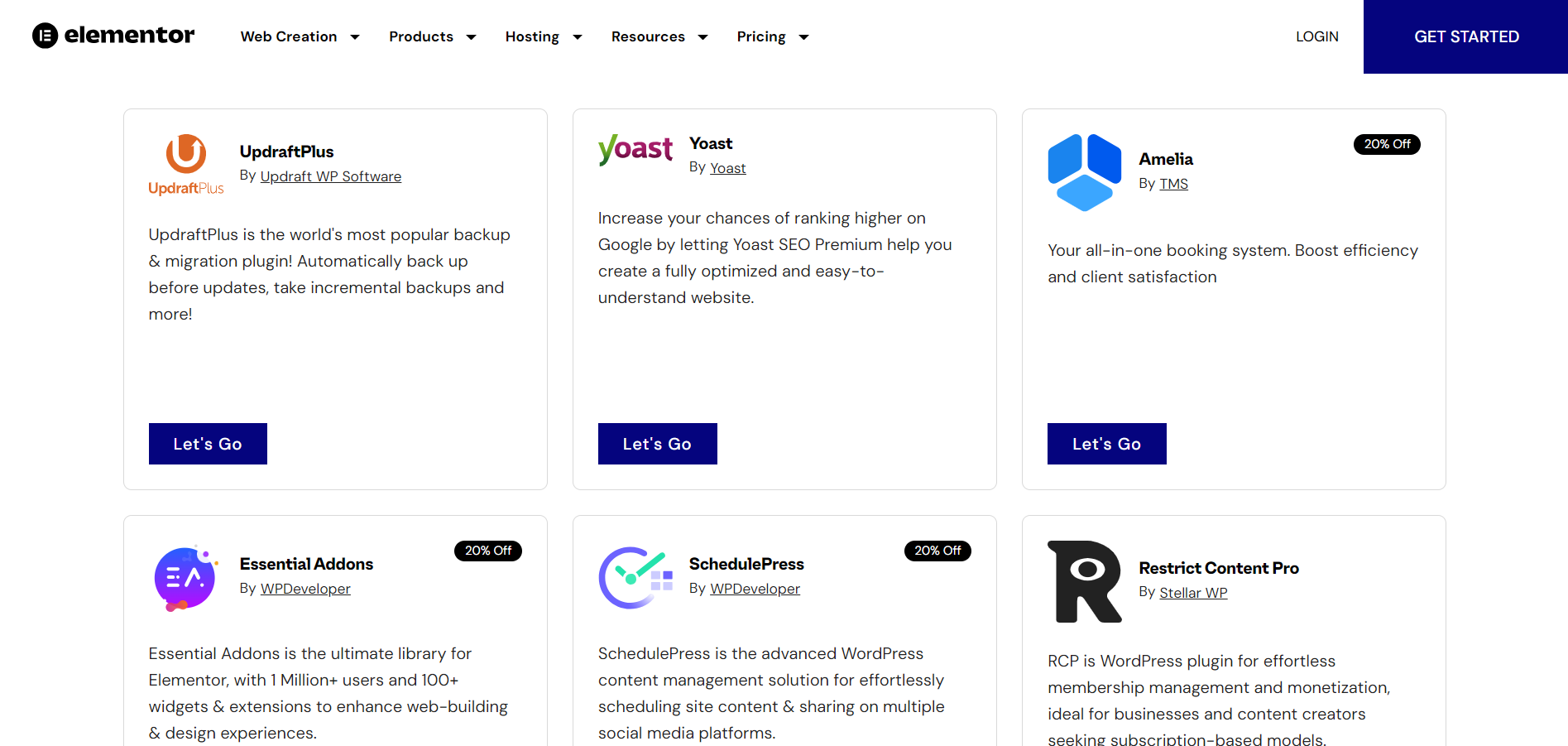
Marketing Features
Design FunctionalitiesRepresents how well each platform allows for creative design and customization of websites.Score Components:
- Template Variety (30%): Range and quality of design templates.
- Customization (30%): Flexibility and options for design alterations.
- User Interface (20%): Ease and intuitiveness of the design process.
- Responsiveness (10%): Adaptability to different devices and screen sizes.
- Innovation (10%): Unique design features and tools.
 8.1
8.1
 7.8
7.8
🏆
Overall Winner: Squarespace
. Squarespace stands out for its more advanced and integrated marketing tools, especially in analytics and ad campaign management. Elementor, while offering a range of marketing features, relies more on integrations with other plugins and services.
 |
 |
|
|---|---|---|
SEO Tools |
✓ (with integration of various SEO plugins) |
|
Email Marketing |
✓ (with integration of various email marketing services and plugins) |
|
Blogging |
||
Social Media Integration |
Direct linking and selling on social platforms, plus feed displays on-site |
Integration of social media buttons |
Analytics and Reporting |
Detailed insights into website performance and visitor behavior |
Yes, with integration of Google Analytics |
Ads and Promotions |
Integration with Google Ads and tools for managing sophisticated ad campaigns |
Yes |
Customer Support
Customer supportEvaluates the quality and availability of support options.Score Components:
- Response time (40%): Speed of support responses.
- Support quality (30%): Effectiveness and helpfulness of the support.
- Availability (20%): Range of support channels (phone, chat, email).
- Resource richness (10%): Quality of self-help and educational materials.
 7.8
7.8
 7.2
7.2
🏆 Winner: Squarespace
. Comparing Squarespace vs Elementor, Squarespace takes the lead in this category with its comprehensive support options. Squarespace offers live chat, email, a community forum, and a help center. Live chat and phone support are available on weekdays from 6 AM to 6 PM PST, while email support is available 24/7. The community forum and help center provide 24/7 access, ensuring users can find help at any time. Additionally, Squarespace offers enterprise-level support with a dedicated account manager and priority support.
Elementor, on the other hand, provides 24/7 support through ticketing and live chat, ensuring users can get assistance whenever needed. However, it lacks the extensive support options and enterprise-level support that Squarespace offers. Despite this, Elementor’s 24/7 availability is a significant advantage for users who need immediate help at any time.
Security
SecurityLooks at the platforms’ security measures and data protection.Score Components:
- Data protection (40%): Safeguards for user and customer data.
- SSL and encryption (30%): Implementation of secure connections.
- Compliance (20%): Adherence to industry security standards.
- Regular updates (10%): Frequency of security updates and patches.
 8.8
8.8
 9.1
9.1
🏆
Winner: Elementor
. Elementor edges out Squarespace with a slightly higher security score of 9.1 compared to Squarespace’s 8.8. Elementor leverages Google Cloud’s infrastructure for high security, including end-to-end encryption. It also employs both active and passive security measures, including 24/7 monitoring, regular updates, backups, and specialized security protocols to protect against common threats. Elementor’s commitment to security is further emphasized by its ISO 27001 certification and a proactive Bug Bounty program.
Although it may not offer the same level of specialized ecommerce security features as Elementor, Squarespace also prioritizes data privacy and security through secure server storage, encryption, strict access controls, and compliance with regulations such as GDPR and CCPA. It also prioritizes website security through built-in features, including secure hosting, SSL certificates, vulnerability scanning, malware and spam filters, two-factor authentication, data encryption, and compliance with security regulations like PCI-DSS and GDPR.
AI Capabilities
AI capabilitiesMeasures the effectiveness of AI-driven features and tools.Score Components:
- Automation efficiency (40%): Impact of AI on streamlining processes.
- Personalization (30%): AI-driven customization for users or customers.
- AI-Assisted design (20%): Role of AI in website design and functionality.
- Data analysis (10%): Use of AI in interpreting user data and analytics.
 7.5
7.5
 7.4
7.4
 |
 |
|
|---|---|---|
AI Builder |
AI builder integrated from version 3.13 |
|
AI Ecommerce Features |
AI-powered copywriting, SEO optimization, personalized email marketing |
AI-driven features for eCommerce websites |
AI Content Generation |
Generates diverse content including product descriptions, website copy, blog posts |
AI content generation capabilities including text and code generation |
Additional AI Features |
SEO optimization, related product recommendations, email marketing insights |
Integration of third-party AI powered WordPress plugins or widgets |
🏆 Winner: Elementor
. Elementor, with a score of 7.4, edges out Squarespace with its integrated AI builder and the ability to generate text, custom codes, and images directly within the editor. It also offers a suite of AI-driven features for eCommerce websites and the ability to integrate third-party AI powered WordPress plugins or widgets.

Squarespace, scoring 7.5, offers various AI-powered features to assist with website creation and provides valuable assistance in eCommerce by offering AI-powered copywriting, SEO optimization, and personalized email marketing campaigns. However, it lacks a fully automated AI builder.
User Management
User ManagementAssesses the platforms’ capabilities in managing user roles, permissions, and accessibility.Score Components:
- Role Customization (40%): Flexibility in creating and defining user roles and
permissions. - Ease of Management (30%): User interface and tools for managing users.
- Access Control (20%): Effectiveness of access control measures for different user
levels. - Scalability (10%): Ability to manage a growing number of users efficiently.
 7.4
7.4
 8.8
8.8
🏆 Winner: Elementor
. Both Squarespace and Elementor offer different levels of user management, but Elementor’s flexibility and integration with WordPress roles and permissions give it an edge.
- Squarespace’s user management varies by plan. The Personal Plan allows one owner, Business and Commerce Plans permit 2 collaborators with different access levels, and the Enterprise Plan offers unlimited users, each with customizable access privileges.
- Elementor’s user management is based on the roles and permissions set within WordPress. Administrators have full access to edit any part of the site, including Elementor settings, while Editors can manage posts and pages made with Elementor. Authors and Contributors have limited capabilities. Elementor Pro offers a Role Manager feature, enabling further customization of what different roles can do within Elementor.
Squarespace User Roles and Access Levels:
| Role | Description | Access Highlights |
|---|---|---|
| Owner | The primary user who created the website and has full access. | Full site access, including billing, site settings, content editing, and member management. |
| Administrator | Users granted nearly full access to manage the site alongside the Owner. | Access to most areas except for some owner-specific settings like ownership transfer. |
| Content Editor | Users focused on adding and managing site content without full site access. | Can add, edit, and delete content on pages, blog posts, and manage comments. |
| Billing | Users who manage the subscription and billing details. | Access to billing information and the ability to update subscription details. |
| Store Manager | Users who manage the ecommerce aspects of the site. | Can manage inventory, fulfill orders, manage customers, and view sales analytics. |
| Custom | A role defined by the site owner or administrators with specific access. | Customizable access as defined by the Owner or Administrators, can vary widely between sites. |
Elementor User Roles and Access Levels:
| Role | Description | Access Highlights |
|---|---|---|
| Administrator | Users with full access to all administration features, including Elementor settings. | Can edit all content, Access to Elementor settings, Can install plugins and themes, Can manage users |
| Editor | Users who can manage and publish content including pages and posts. | Can edit pages/posts created with Elementor, Cannot access Elementor settings, Can manage categories, tags, and links, Can moderate comments |
| Author | Users who can publish and manage their own posts. | Can create posts with Elementor, Cannot edit pages, Limited access to media library, Cannot access Elementor settings |
| Contributor | Users who can write and manage their own posts but cannot publish them. | Can create content with Elementor, Cannot publish or edit pages, No access to Elementor settings, Submissions require review by higher-level roles |
Additional Features
 |
 |
|
|---|---|---|
SSL Certificate |
||
Custom Domain |
||
Free Custom Domain Included |
||
International Domains |
||
Mobile Responsive |
||
Page Speed |
||
Website Builder Mobile App |
||
Convert a Website To An App |
||
Website Analytics |
||
Multilingual Sites |
||
Multiple Users |
Squarespace vs Elementor: User Feedback
Squarespace is well-liked for its easy-to-use interface and versatile tools, making it ideal for those who aren’t tech-savvy. It offers various features like website creation, SEO, online selling, and more, catering to different users. Customers appreciate its good customer support and visually appealing templates, creating a professional online presence. However, some users find issues with domain transfer/setup, limited customization options, and consider the pricing slightly higher. There are also occasional concerns about customer service and technical limitations like template rigidity and missing features.
Elementor is widely appreciated for its intuitive drag-and-drop interface, enabling rapid creation of professional and responsive websites without coding skills. It offers a vast range of templates and compatibility with WordPress, making it a go-to for diverse users. Despite its benefits, concerns arise regarding website loading times, subscription costs, and occasional compatibility issues. Feedback on customer support and legacy plan management is mixed, with some users experiencing dissatisfaction. Overall, Elementor is valued for its efficiency in web development, although some aspects, particularly support services, could be improved.
The making of this blog
We followed a clear, step-by-step process to write and research this article.
Squarespace vs Elementor: FAQ
Which is better for ecommerce, Squarespace or Elementor?
Can I use Squarespace or Elementor for a blog or informational website?
How do Squarespace and Elementor compare in terms of design and templates?
Which platform is easier to use?
What are the pricing options for Squarespace and Elementor?
Which platform offers better customer support?
How do Squarespace and Elementor handle website security?
Which platform is better for users needing advanced AI capabilities?
Can I manage multiple users with Squarespace or Elementor?
Are there any significant differences in additional features between Squarespace and Elementor?









